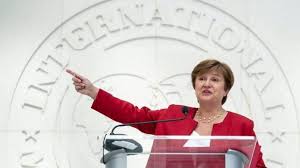International Monetary Fund IMF, Managing Director Ms Kristalina Georgieva has said that the Fund anticipate the worst economic fallout since the Great Depression when the Covid 19 pandemic is over. Speaking in her virtual pre IMF/World Bank Spring Meetings press briefing in Washington she said “We are still faced with extraordinary uncertainty about the depth and duration of this crisis. It is already clear, however, that global growth will turn sharply negative in 2020. In fact, we anticipate the worst economic fallout since the Great Depression. Just three months ago, we expected positive per capita income growth in over 160 of our member countries in 2020. Today, that number has been turned on its head: we now project that over 170 countries will experience negative per capita income growth this year.”
“If the pandemic fades in the second half of the year—thus allowing a gradual lifting of containment measures and reopening of the economy—our baseline assumption is for a partial recovery in 2021. But again, I stress there is tremendous uncertainty around the outlook: it could get worse depending on many variable factors, including the duration of the pandemic. Just as the health crisis hits vulnerable people hardest, the economic crisis hits vulnerable countries hardest… In the last two months, portfolio outflows from emerging markets were about $100 billion—more than three times larger than for the same period of the global financial crisis.”
“The encouraging news is that all governments have sprung into action and, indeed, there has been significant coordination. Our Fiscal Monitor next week will show that countries around the world have taken fiscal actions amounting to about $8 trillion. In addition, there have been massive monetary measures from the G20 and others. “We have $1 trillion in lending capacity and are placing it at the service of our membership. We are responding to an unprecedented number of calls for emergency financing—from over 90 countries so far. Our Executive Board has just agreed to double access to our emergency facilities, which will allow us to meet the expected demand of about $100 billion in financing. “We are reviewing our tool kit…We are working with donors to increase our Catastrophe Containment and Relief Trust to $1.4 billion…And together with the World Bank, we are calling for a standstill of debt service to official bilateral creditors for the world’s poorest countries.”

